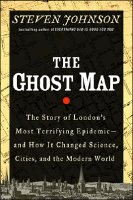"Ghost" in the Machine
 As I had mentioned earlier, I have been reading "The Ghost Map", Steven Johnson's look into the 1854 London cholera epidemic. Now that I've finished it, I can say it's a fine book, notwithstanding the extended passages involving fecal matter and Johnson's habit of wandering in places.
As I had mentioned earlier, I have been reading "The Ghost Map", Steven Johnson's look into the 1854 London cholera epidemic. Now that I've finished it, I can say it's a fine book, notwithstanding the extended passages involving fecal matter and Johnson's habit of wandering in places.
A medical mystery chronicling an eight-day outbreak that touched almost every family in the Broad Street area, Johnson uses this event both as a focal point for discussing the evolution of cities and how this event helped to change how we combat large-scale epidemics. One begat the other-- the infrastructure of London helped the cholera breed in 1854. The end chapters, which looks at the future could hold in disease management, are even more eerie and chilling.
As Johnson himself writes in his blog, "So many of the issues that define the modern world today -- the runaway growth of megacities, environmental crises, fears of apocalyptic epidemics, digital mapping, the need for clean water, urban terror, the rise of amateur expertise -- are there, in embryo, in the Broad Street outbreak." Talk about a giant premise, one that he ultimately tackles well.
To me, though, the most eye-opening part of his book comes towards the end when he discusses what could happen in the future. Noting that by 2015, the largest cities are expected to be Tokyo, Mumbai, Dhaka, Sao Paulo and Dehli -- astonishingly, each with populations of more than 20 million -- he writes, "the megacities of the twenty-first century will have to learn all over again the lessons that London muddled through in the nineteenth." We are left with the impression that cholera could strike a major city again, and be even more deadly. Also intriguing is his idea that global warming and the energy crunch "will have disruptive effects on existing cities in the coming decades".
Those expecting only the blow-by-blow of what happened in 1854 will ultimately be disappointed. It's more than that. It's also not the normal Johnson polemic-- it's a large departure from his earlier works, and an improvement. I would love to see him tackle this vein, the historical thriller, again.

No comments:
Post a Comment